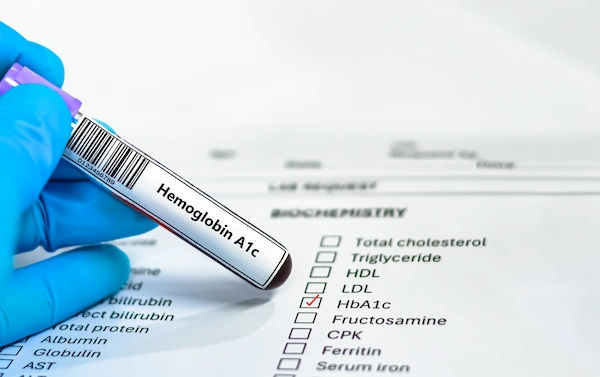Is Wheat Good For Diabetes?
As a staple food in many cultures, wheat is consumed in various forms, from bread and pasta to cereals and snacks. But is wheat good for diabetes? Let's understand here.

Written by Dr Sonia Bhatt
Last updated on 13th Jan, 2026
Diabetes is a chronic condition that affects millions of people around the world. It requires careful management of diet and lifestyle to maintain healthy blood sugar levels. One of the most frequently asked questions among individuals with diabetes is about the role of wheat in their diet. As a staple food in many cultures, wheat is consumed in various forms, from bread and pasta to cereals and snacks. But is wheat good for diabetes? Let's take a closer look.
Understanding Wheat and Its Types
Wheat is a type of grain that is commonly used in a variety of foods. It comes in two main forms: whole-grain wheat and refined wheat.
Whole Grain Wheat: This form of wheat includes all three parts of the grain kernel - the bran, germ, and endosperm. Whole grain wheat is known to be more nutrient-dense, containing higher amounts of fibre, vitamins, and minerals compared to refined grains. It is usually found in foods like whole wheat bread, whole wheat pasta, and wheat berries.
Refined Wheat: This form of wheat has been processed to remove the bran and germ, leaving only the starchy endosperm. This process results in a finer texture and longer shelf life, but it also strips away much of the fibre, vitamins, and minerals. Refined wheat is commonly found in white bread, white pasta, and many baked goods.
The Glycemic Index (GI) and Glycemic Load (GL)
One important factor to consider when evaluating the impact of wheat on diabetes is its glycemic index (GI) and glycemic load (GL). The GI measures how quickly a carbohydrate-containing food raises blood sugar levels, while the GL takes into account both the GI and the amount of carbohydrates in a serving.
Whole Grain Wheat: With a GI value of around 45, whole grain wheat is considered a low GI food, causing slower and more gradual increases in blood sugar levels.
Refined Wheat: Refined wheat products have higher GI values. For instance, white bread, a common refined wheat product, has a GI ranging from 70-85, leading to quicker spikes in blood sugar levels.
Wheat and Blood Sugar Control
Managing blood sugar levels is crucial for individuals with diabetes. Whole grain wheat may be beneficial for blood sugar control due to its higher fibre content. Fibre slows down the digestion and absorption of carbohydrates, leading to a more stable release of glucose into the bloodstream.
However, it is important to note that even whole grain wheat can impact blood sugar levels, especially if consumed in large quantities. Portion control and balanced intake are key to regulating the blood sugar level on check.
Potential Benefits of Whole Grain Wheat
Despite its carbohydrate content, whole grain wheat offers several potential benefits for individuals with diabetes:
Fibre: Whole grain wheat is high in dietary fibre, which can help improve digestive health and promote feelings of fullness, potentially aiding in weight management. Maintaining a healthy weight is important for controlling diabetes.
Nutrients: Whole grain wheat is a good source of essential nutrients, including B vitamins, iron, and magnesium. These nutrients play important roles in energy metabolism, red blood cell production, and overall health.
Heart Health: Consuming whole grains, including whole grain wheat, has been associated with a reduced risk of cardiovascular diseases. Since individuals with diabetes are at higher risk for heart disease, incorporating whole grains into the diet can be beneficial.
Considerations for Including Wheat in a Diabetes Diet
While whole grain wheat can be a part of a healthy diabetes diet, there are several considerations to keep in mind:
Portion Sizes
Large portions of any carbohydrate-rich food, including whole grain wheat, can lead to blood sugar spikes. It is essential to monitor portion sizes and be mindful of the total carbohydrate intake in each meal.
Total Carbohydrate Intake
Keeping an eye on the total carbohydrate intake throughout the day is crucial for managing diabetes. Whole grain wheat, despite its benefits, still contains carbohydrates that can affect blood sugar levels. Balancing it with other nutrient-dense foods can help maintain stable blood sugar levels.
Individual Responses
Each person's body responds differently to different foods. It is important for individuals with diabetes to monitor their blood sugar levels to understand how their body reacts to whole grain wheat. Working with a healthcare provider to determine the best dietary choices tailored to individual needs is highly recommended.
Combining Foods
Incorporating proteins, healthy fats, and vegetables along with whole grain wheat can help in maintaining stable blood sugar levels. A balanced diet that includes a variety of foods is essential for overall health and effective diabetes management.
Practical Tips for Including Whole Grain Wheat in a Diabetes Diet
Incorporating whole grain wheat into your diet mindfully can offer health benefits for individuals managing diabetes. Here’s how you can do it effectively:
Choose Whole Wheat Products
Selecting whole wheat products over refined grains can significantly improve your diet quality. Look for labels that specify "100% whole grain" or "whole wheat." Common options include whole wheat bread, pasta, and flour. These choices increase fibre intake, which helps stabilise blood sugar levels.
Start Your Day with Whole Grains
A nutritious breakfast sets the tone for the rest of the day. Opt for whole wheat cereals or porridge as your morning meal. Choose plain, unflavored cereals to avoid added sugars and enhance them with fresh fruits. Whole wheat porridge can be cooked with wheat berries and topped with nuts, seeds, or berries for a hearty and nutritious start.
Try New Whole Grain Dishes
Exploring new recipes keeps your diet interesting and ensures a variety of nutrients. Tabbouleh and wheat berry salad are excellent choices:
Tabbouleh: This Middle Eastern salad made with whole wheat bulgur, fresh vegetables, and herbs is both delicious and nutritious.
Wheat Berry Salad: Combine cooked wheat berries with various vegetables, legumes, and a light vinaigrette for a satisfying meal.
Alternative Grains for Diabetes
For those looking to diversify their diet, there are several other grains and flours that may be beneficial for diabetes management:
Quinoa: A high-protein, gluten-free grain with a low GI. It is rich in fibre, vitamins, and minerals.
Barley: Another whole grain with a low GI that can help stabilise blood sugar levels and improve heart health.
Buckwheat: Despite its name, buckwheat is not related to wheat and is gluten-free. It has a low GI and is rich in nutrients.
Oats: Whole oats and oatmeal have a moderate GI and are high in soluble fibre, which can help manage blood sugar levels.
Conclusion
Wheat, particularly in its whole grain form, can indeed be a part of a healthy and balanced diet for individuals with diabetes. The fibre and nutrients found in whole grain wheat offer several benefits, including improved digestive health, better weight management, and enhanced heart health.
However, monitoring portion sizes, total carbohydrate intake, and individual blood sugar responses is imperative to ensure that wheat consumption remains beneficial. By making informed choices and working closely with healthcare providers, individuals with diabetes can enjoy wheat and other grains as part of a nutritious and varied diet, ultimately supporting their overall well-being and diabetes management.
Consult Top Endocrinologists
Consult Top Endocrinologists

Dr G Prathyusha
General Physician/ Internal Medicine Specialist
6 Years • MBBS DNB (Family medicine), CCEBDM (Diabetology), PGDGM (Geriatrics), Primary care Rheumatologist.
Bengaluru
PRESTIGE SHANTHINIKETAN - SOCIETY CLINIC, Bengaluru

Dr. Shrikrishna V Acharya
Endocrinologist
25 Years • MBBS, MD, DM(Endocrinology), MRCP (Endocrinology)
Bengaluru
Apollo Clinic, JP nagar, Bengaluru

Dr. Chaithanya R
Internal Medicine Specialist Diabetologist
16 Years • MBBS, MD Internal Medicine, Fellowship in Diabetes(UK), CCEBDM(PHFI)
Bangalore
Apollo Clinic Bellandur, Bangalore
(75+ Patients)

Dr. Shruthi B
Endocrinologist
20 Years • MBBS,MD ( GEN MED) DM (ENDOCRIONOLOGY)
Bengaluru
Apollo Clinic, JP nagar, Bengaluru

Dr. Nilotpal Mitra
General Physician/ Internal Medicine Specialist
21 Years • MBBS, PGDGM ( Geriatric Medicine), ACMDC (an Advance course in Diabetes and cardiovascular diseases from PHFI and WHF )
Kolkata
MCR SUPER SPECIALITY POLY CLINIC & PATHOLOGY, Kolkata
(25+ Patients)


